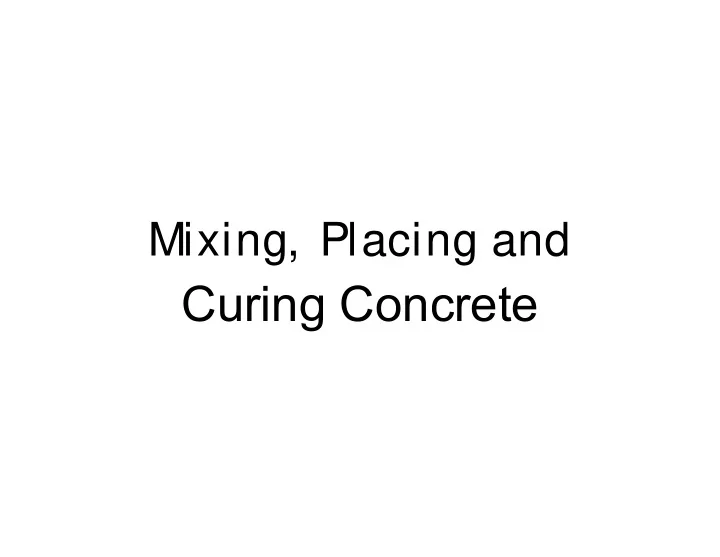

Mixing, Placing and Curing Concrete
Concrete S tart to Finish 1. Batch 2. Mix 3. Transport 4. Place 5. Consolidate 6. Finish 7. Cure CIVL 3137 2
Concrete S tart to Finish 1. Batch Ready 2. Mix Mixed 3. Transport 4. Place 5. Consolidate 6. Finish 7. Cure CIVL 3137 3
Ready-Mixed Concrete Ready-Mixed Concrete Central Shrink Transit Mixing Mixing Mixing CIVL 3137 4
Central Mixing • Approximately 20% of all plants in US • Concrete is completely mixed using a stationary mixer (drum, paddle, pan) • High production volumes (4000 yd 3 /day) • Rapid mixing (30 to 120 seconds) • Improved quality control • Can use ordinary dump trucks for transit CIVL 3137 5
Concrete Wet Mix Plant Mixer Aggregate Bins Cement and Fly Ash Silos Control Room https://www.easymixconcrete.com/news/the-ready-mix-concrete-process/ CIVL 3137 7
8 Concrete Wet Mix Plant CIVL 3137
Concrete S lipform Paving https://www.gomaco.com/Resources/gp2400.html CIVL 3137 11
Concrete S lipform Paving https://www.gomaco.com/Resources/gp2400.html CIVL 3137 12
S hrink Mixing • Concrete is partially mixed using a stationary plant mixer to reduce volume • 1 yd 3 of fully mixed concrete requires 1½ yd 3 of ingredients • Concrete finishes mixing in a transit mix truck on the way to the job site CIVL 3137 19
21 Transit Mix Truck CIVL 3137
Transit Mix Truck https://concretetruckmixer.net/volumetric-concrete-mixer-truck/ CIVL 3137 22
Transit Mix Trucks • 9-12 yd 3 mixing drums are typical • Low speed rotation (2 rpm) agitates • High speed rotation (12-15 rpm) mixes • Drum rotates one direction to mix • Drum rotates the other to discharge CIVL 3137 24
Transit Mix Truck OPERATION OF A TRUCK MIXER https://en.wikipedia.org/wiki/Concrete_mixer CIVL 3137 25
Transit Mixing • Concrete is batched dry at a central plant and placed in a transit mix truck • Water is either added at the plant or from a tank on the truck itself • Concrete is mixed entirely in the truck CIVL 3137 27
Dry Batch Concrete Plant https://www.cmi-roadbuilding.com/concrete CIVL 3137 28
Dry Batch Concrete Plant https://www.ceienterprises.com/literature/52-products/concrete-equipment/ CIVL 3137 29
Transit Mixing Options 1. Mixing at the batch plant a) Mix for 50 revs at 12-15 rpm at batch plant b) Agitate at 2 rpm while in transit 2. Mixing in transit a) Mix for 70 revs at 8 rpm while in transit b) Agitate at 2 rpm until ready to discharge 3. Mixing at the job site a) Agitate at 2 rpm while in transit b) Mix 50-100 revs at 12-15 rpm at job site CIVL 3137 30
Concrete S tart to Finish 1. Batch 2. Mix 3. Transport 4. Place 5. Consolidate 6. Finish 7. Cure CIVL 3137 31
Placement Methods Wheelbarrow Conveyor Belt Chute Bucket Pump Tuckerbilt CIVL 3137 32
33 Chute Delivery CIVL 3137
34 Bucket Delivery CIVL 3137
35 Concrete Pumping CIVL 3137
36 Concrete Pumping CIVL 3137
38 Tuckerbilt CIVL 3137
Concrete S tart to Finish 1. Batch 2. Mix 3. Transport 4. Place 5. Consolidate 6. Finish 7. Cure CIVL 3137 39
Consolidation Consolidation is the process of reducing the volume of voids, air pockets, and entrapped air in fresh concrete, usually through the input of mechanical energy (e.g., vibrating, tamping, or rodding). CIVL 3137 40
Consolidation Consolidation is needed because freshly placed concrete is usually honeycombed with entrapped air voids that are larger than the intentionally entrained air voids. Without consolidation, the concrete will be weak, porous, and poorly bonded to the reinforcement (and unsightly). CIVL 3137 41
42 Poor Vibration CIVL 3137
Poor Vibration https://www.construct-ed.com/concrete-vibration/ CIVL 3137 43
Tamping https://www.concretenetwork.com/concrete/concrete_tools/tampers.htm CIVL 3137 44
Internal Vibrators https://civilsnapshot.com/concrete-vibrators-and-its-type/ CIVL 3137 45
External Vibrators https://www.mooser.net/en/construction-references/industry-construction/bv-augustin-riederau-e.html CIVL 3137 47
Concrete S tart to Finish 1. Batch 2. Mix 3. Transport 4. Place 5. Consolidate 6. Finish 7. Cure CIVL 3137 49
Flatwork Finishing Methods Screeding bringing concrete to correct height Floating pushing coarse aggregate below surface Troweling bringing bleed water to surface and sealing Brooming providing nonskid texture CIVL 3137 50
Flatwork Flatwork is any poured concrete whose surface is horizontal. This includes floor slabs, patios, sidewalks, driveways, and pavements. In tilt-up construction, walls are poured flat on the ground then tilted into place, so that is also a form of flatwork. CIVL 3137 51
S creeding Screeding removes excess concrete and brings the surface to the proper grade. Screeding takes place immediately after the concrete is placed and must be completed before excess bleedwater appears on the surface. CIVL 3137 52
53 creeding S CIVL 3137
Floating Floating fills voids left by screeding and pushes the coarse aggregate particles slightly below the surface. Floating leaves a thin layer of mortar at the surface to aid in finishing. CIVL 3137 54
55 Floating CIVL 3137
Troweling Troweling brings a small amount of bleed water to the surface to produce a hard, dense finish. CIVL 3137 56
57 Troweling CIVL 3137
Brooming / Dragging Brooming and dragging impart a rough texture to the surface of pavement slabs to provide good traction in wet weather. CIVL 3137 58
60 Brooming CIVL 3137
61 Burlap Dragging CIVL 3137
Concrete S tart to Finish 1. Batch 2. Mix 3. Transport 4. Place 5. Consolidate 6. Finish 7. Cure CIVL 3137 62
Concrete Curing Curing is essential to developing proper strength and durability by 1. Maintaining adequate moisture in the concrete to hydrate the cement 2. Maintaining a minimum temperature in the concrete so hydration proceeds at an adequate rate CIVL 3137 63
64 Poor Curing CIVL 3137
Concrete Curing Replacement Methods Barrier Methods ponding plastic sheets fogging curing compounds wet burlap insulating blankets wet straw wet sawdust CIVL 3137 65
66 Ponding CIVL 3137
68 Ponding CIVL 3137
69 Fogging CIVL 3137
Fogging http://www.concretebridgeviews.com/i80/Article3.php CIVL 3137 70
71 traw Wet Burlap / S CIVL 3137
Wet Burlap and Plastic S heeting CIVL 3137 73
74 heeting Plastic S CIVL 3137
75 Insulating Blankets CIVL 3137
76 Curing Compounds CIVL 3137
77 Curing Compounds CIVL 3137
Recommend
More recommend